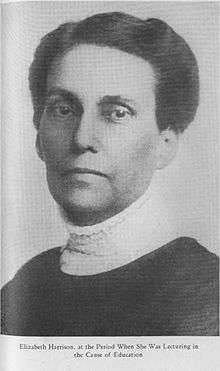Elizabeth Harrison (educator)
| Elizabeth Harrison | |
|---|---|
 Photograph from Sketches Along Life's Road | |
| Born |
September 1, 1849 Athens, Kentucky., U.S. |
| Died |
Oct. 31, 1927 San Antonio, Texas |
| Pen name | Elizabeth Harrison |
| Occupation | College President, founder, educator, and author |
| Nationality | United States |
Elizabeth Harrison (September 1, 1849 – October 31, 1927) was an American educator. She was the founder and first president of what is today National Louis University.[1] Harrison was a pioneer in creating professional standards for early childhood teachers and in promoting early childhood education.[2]
Life
After encountering the early kindergarten movement in Chicago in the 1870s and studying with early kindergarten educator Alice Putnam, Harrison sought further training in St. Louis and New York.[2][3] She then taught kindergarten in Iowa and Chicago. Involving mothers in education, Harrison and Putnam founded the Chicago Kindergarten Club in 1883, influenced by the book Mothers at Play by Friedrich Fröbel.[3] In 1886, Harrison founded a training school for kindergarten teachers in Chicago. Intrigued by the ideas used by a German woman working at her school, Harrison decided to find out more. She tracked these ideas back to the Pestalozzi-Fröbel-Haus in Berlin and in 1889 she traveled there to study. On her return she renamed her institution the Chicago Kindergarten Training College.[4] Harrison's school became an innovative college of education.[5] She was president of the college until her retirement in 1920. It is now part of National Louis University.
Writings
During her career, Harrison wrote a number of books, including: A Study of Child Nature (1890 - which saw 50 editions published in the following years[2]), In Storyland (1895), Some Silent Teachers (1903), Misunderstood Children (1908), Montessori and the Kindergarten (1913) and The Unseen Side of Child Life (1922). In 1893, the college published Harrison's book, The Kindergarten as an Influence in Modern Civilization, in which she explained, "how to teach the child from the beginning of his existence that all things are connected [and] how to lead him to this vital truth from his own observation . . .." [6] Harrison's autobiography, Sketches Along Life's Road, was edited and published in Boston in 1930, after her death.[7][8]
Influence
Nobel Peace Prize winner, Jane Addams of Hull House, said of her colleague and friend, that Elizabeth Harrison "has done more good than any woman I know. She has brought light and power to all the educational world."[9]
In the 1890s, Harrison organized a series of annual conferences in Chicago, which led to the founding of what is today the National Parent Teachers Association (PTA).[2]
References
- ↑ "Our History: The Evolution of NLU". National-Louis University. Retrieved September 11, 2016.
- 1 2 3 4 "Elizabeth Harrison". Encyclopædia Britannica. Retrieved September 11, 2016.
- 1 2 Beatty, Barbara (1997). Preschool Education in America: The Culture of Young Children from the Colonial Era to the Present. Yale University Press. pp. 86–87. ISBN 9780300072730..
- ↑ Geitz, Henry; Heideking, Jürgen; Herbst, Jurgen (1995). German Influences on Education in the United States to 1917. German Historical Institute (Washington, D.C.). Cambridge University Press. pp. 95–98. ISBN 978-0-521-47083-4.
- ↑ Fenton, Sarah (2005). "National-Louis University". The Electronic Encyclopedia of Chicago. Chicago Historical Society.
- ↑ Harrison, Elizabeth (1893). The Kindergarten as an Influence in Modern Civilization. Chicago Kindergarten College.
- ↑ Catalog of Copyright Entries. New Series: 1930. Copyright Office, Library of Congress. 1931. p. 910.
- ↑ "Elizabeth Harrison, 1849-1927". National Louis University Archives and Special Collections.
- ↑ "A History of Innovation." 2010. History: National-Louis University (retrieved, July 30, 2010)
External links and sources
| Wikimedia Commons has media related to Elizabeth Harrison. |
- Works by Elizabeth Harrison at Project Gutenberg
- Works by or about Elizabeth Harrison at Internet Archive
- National-Louis University
- National–Louis University Online Archive and Special Collections
- Famous American Women: A Biographical Dictionary from Colonial Times to the Present ed. Robert McHenry (Merriam-Webster, Inc. 1980) p. 179.